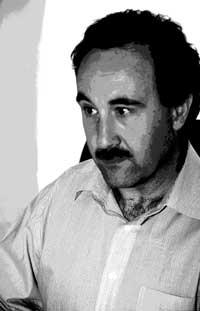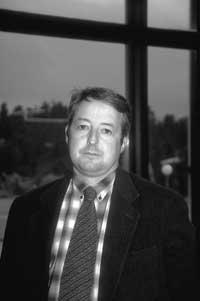New challenges in chemistry 1996
1996/02/01 Arrojeria, Eustakio - Elhuyar Zientziaren Komunikazioa | Kaltzada, Pili - Elhuyar Zientziaren Komunikazioa Iturria: Elhuyar aldizkaria
The conferences, organized by the Faculty of Chemistry of the University of the Basque Country, were attended by experts from different areas who explained the main lines of the next five years. In addition to many topics of interest, we have left a clear idea on the table: in the future the relations between the university and the company will be more enthusiastic or there will be no future.
Looking ahead
Unai Ugalde, Vice Dean of the Faculty of Chemistry and conference organizer, explained the main objective of this initiative. When learning about education and research, they often complain about the technology our companies have today. Today, he told us that our companies are in a situation of dependency and that this can lead to mortgage the future. As Unai said, our companies continue to address countries that have the key to development, we can say that Euskal Herria is a territory that has to import different disciplines. This has been at least the main trend of the last 20 or 25 years. It is true that in recent years this situation has changed, but the operating models of companies have not been renewed to the same extent. Consequently, we remain conditioned by dependence.
And what can be done to change it? As a reader, we also came up with this question and, as heard in the presentation, we can provide the main answer: innovate, renew the operating models of the company and the university. The future will have to say, but as we were told in Donostia, the importance of this process of renewal, both economic and historical, will be total.
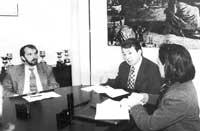
And who should take the first step? This is the million dollar question. According to experts, the active participation of three main actors is necessary to meet the new challenge. On the one hand, an industrial fabric that must show a clear tendency to change and innovate customs so far; on the other hand, the institutions responsible for high education and led by the University: promoting research projects and making a special effort to know directly the needs with companies; and on the other, the political and social institutions that will guide our productive, educational and social backbone.
As head of the group Ian in charge of organizing the conference, Unai Ugalde "asked" about the role that the university will play in this process. The university, through education and research, told us that it has to have a lot of responsibility in the new culture of collaboration. In his opinion, the lecture series organized by the Faculty of Chemistry and the philosophy of An that brings together can be a good tool for this.
However, from philosophy to reality there is a great leap. Aware of this, the host contexts are being renewed. The experts who will come to San Sebastian, each in their respective fields Ian, are pointers and it can be said that the lines of development that we will know in the coming years are predictable. Therefore, they were invited to participate in a more global vision of the viability of the industrial and educational projects being carried out at this time. Thus, two types of activities have been developed. On the one hand, through the talks the opportunity is being offered to know details and directions of the future about their area of research and, on the other, direct contact with companies that will benefit from this area of research has been promoted. The objective of these actions is that they serve to guide the strategies of companies towards leading directions today.
Finally, we asked Unai about the role of the students. As far as the university is a training tool, it is also intended to be clarifying for students. He told us that knowledge is innovating in all areas and that reaching them is in the hands of all students. We have listened to the experts who participated in the Donostia conference that the perceptions of dynamism will be a tool to guide future professionals towards the world of Ian and research. So be it.
Lelo, the usual motto
Having mentioned it frequently has not been clarified until now and we talk about the usual motto, with the excuse of the days of the Faculty of Chemistry. In fact, among those attending the presentation of the sessions there was a great concern for the "feed-back" between company and research.
Unai Ugalde pointed out that the first request should come from companies if the relationship is to work properly. "If the industrial sector does not go to university to ask for collaboration, researchers will hardly be trained in the real needs of companies. On the other hand, it is known that some companies have developed their own research solutions to meet these needs and that you may think they do not need university. In any case, the challenge cannot be left to companies. And the university has not always been successful when it comes to approaching companies, so companies do not know the resources that the university has, neither materials nor intellectuals ".
Does this mean a lack of university? Are there no research at our universities? Unai responded negatively to the question. Always with some nuances. According to the Vice-Dean of the Faculty of Chemistry, "research is done at the University of the Basque Country, but we don't always succeed in conducting applied research." For this, Mr. Ugalde provides the following data: Only 10-15% of the research carried out at the UPV/EHU will be applied later in the industries, while in Japan it is 40-35% and in the US it is 25%.
On the other hand, it can be said that research aimed at the direct needs of the industry only reaches 4%. This indicates that the incidence of the university in productive processes is very low. Although many are unaware, the UPV/EHU publishes 5 or 6 patents annually, but so far only one has been sold in an external company. This clearly reflects the chasm between the two agents.
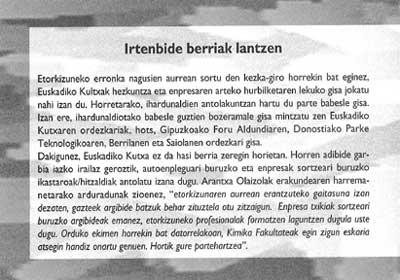
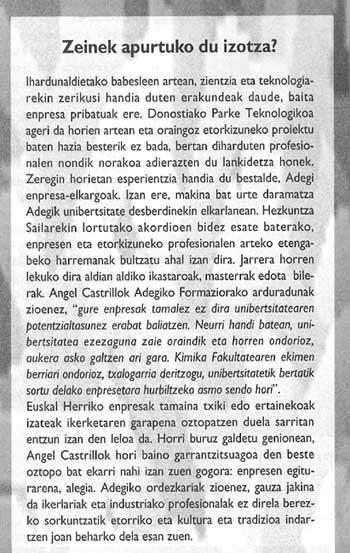
Thursday 15 February Thursday, February 29 Arturo Thursday, March 14 |
Jon Larrañaga This is how UPV professor Felix Mari Goñi spoke at his conference inaugurating the sessions in Donostia: "Biochemistry 2000". Let's see why. Forecast year 2000The central focus of the colloquium was on the main advances of the beginning of the following century: "At the beginning of the next century we will have the same thing we have today, but more developed." In Goñi's words, rapid changes in the coming years will focus on the three areas outlined below. Advances in genome sequencing will be particularly prominent. It can be predicted that by 2000 the genomes of different species will be perfectly sequenced and that the sequencing of the rat and human genomes will also be very advanced. Better and faster methods of gene sequencing will also appear that will help to understand the mechanisms that regulate genital expression and, ultimately, to better understand life and the history of life. On the other hand, although no diseases occur (most disease-causing genes are already known), defective genes will be detected that facilitate the appearance of diseases. This will allow to design drugs against these diseases and apply new forms of prevention. The conference also discussed the possibility of studying unimplanted embryos. By removing some cells from the embryos in vitro state, the embryo is harmless and can normally be implanted in the mother's uterus. The presence of defective genes in the embryonic cell thus obtained can be sought and, where appropriate, use gene therapy before embryo implantation. As is known, gene therapy sessions have already been conducted to try to cure hemophilia, rheumatoid arthritis or cancer. However, in the following century an injection will suffice to carry out these therapies. In this way, healthy genes that will replace damaged genes are expected to be transferred to different cells in the body. Pharmacology will also know the development described so far. Goñi pointed out that "in the coming years the rational design of drugs will prevail. The drugs will be designed by computer and can be predicted before synthesizing their properties. However, this will not be the only way for drugs to be incorporated. New sources will also be explored, especially the sea." This development will reach virtually all areas. As for contraceptives, the main novelties come from the hand of hormonal implants. These implants will be inserted under the woman's skin and guarantee a contraception of 3-5 years. Goñi pointed out that this is a forecast of only five years, but obviously, the new development will be a big change. Cancer is one of the diseases that most concern us today. When asked about it, Goñi stressed that the fight against cancer will take advantage of many of the aforementioned advances. " Defective genes will be found to facilitate cancer, chemical prevention methods and gene therapies will be developed. Early detection of cancer will also progress and tumors will be found before and after. So you can think they can be cured more easily." Where does science go?In addition to being a Professor at the UPV, Félix Goñi is Director of Scientific Policy of the Basque Government. The San Sebastian program also offered the opportunity to talk about this second aspect and made some reflections on the social, political and ethical aspects of all these advances in the coming years. We wanted to bring to this corner the most interesting and although it is difficult to make predictions, so that we understand better the attitudes that will be seen in the near future. The science of the following century will be in the hands of politicians, so priorities will vary according to the interests of each moment. Obviously, this means that scientific projects will have a lot to do with, Our society will have an increasingly important obligation to science. Goñi stressed that there will be more concern for scientific progress and that the popular debate on the ethical aspect will prevail. He also talked about the relationship between science and business. The new lines of scientific development will have a great importance in the biotechnology industry, which can be an important source of wealth. In any case, this will be perceived, mainly, for the sector that is encouraged to launch courageous business initiatives. What if there is something in Euskal Herria? Faced with this question, unfortunately, the Director of Scientific Policy was not very optimistic. |

Gai honi buruzko eduki gehiago
Elhuyarrek garatutako teknologia



